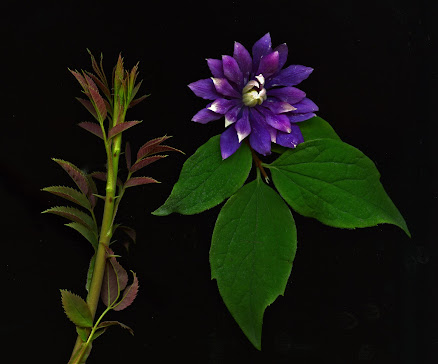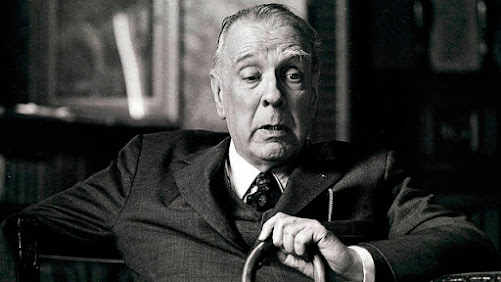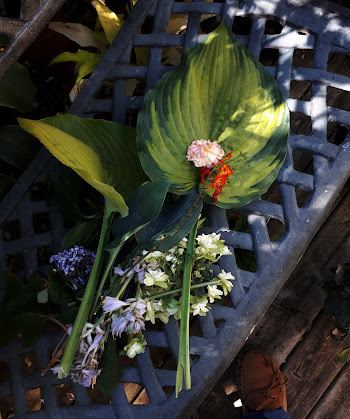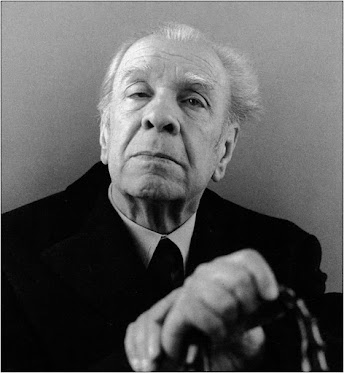Sharing Roses With Companion Plants
Saturday, August 06, 2022
 |
Rosa 'Leander' & Clematis 'Taiga' 6 August 2022
|
 |
Rosa 'Leander' 6 August 2022
|
Because few come to my August garden and I am not sharing
its beauty with my Rosemary I can do stuff I would have never considered in
other years. My healthy English Rose, Rosa ‘Leander’ a fave of Rosemary’s came
out and I noticed today 6 August 2022, that it had a healthy new cane. It is beautiful
so I decided to cut it (!!) to scan it. This means that next year what is left of the cane will not have roses. It is remarkably beautiful, but then
there is this other scan of Leander’s new
growth a few days back.
Rosemary's interest in little things botanical .
Leander and other roses in my garden
Because I am going to be giving a Zoom talk to the Canadian
Rose Society titled Plants & their Rose Companions , I scanned Leander with a
companion plant, Clematis ‘Taiga’ that Rosemary planted in the spring of 2020, a
few months before she died on 9 December.
This recent scanning obsession of mine is taking me a tad
away from my original intent with my plant scanographs which was to be accurate
in the visible description of my garden plants. I have become artsy!
And it is fun. Rosemary would approve that I will attempt to convince the folks of the Canadian Rose Society to share their rose garden with other plants.
There is a sad note. After I scan my plants, I put some of the roses in vases. But most of the plants I throw into my green bin.
Complicated Association
Friday, August 05, 2022
 |
Rosa 'Complicata' 5 August 2022
|
With a lot
of frequency I have written here that what makes us human and separates us from some
other earthly life forms is our ability to associate disparate things. In some
cases those associations are entirely personal (objective?) involving memories
from the past that somehow connect with an event or something seen, heard,
touched, tasted or smelled in a contemporary setting.
Consider
this scan today of the Gallica Rose, Rosa ‘Complicata’. Immediately when I
write that I know that not too long ago it would have been written Rosa
complicata noting that this beginning-of-the-20th century
introduction once was seen as a species but now it is considered a cultivar
which means that some human may have combined the pollen of a couple of roses.
My very
large Rosa ‘Complicata’ was given to me 30 years ago by the New Zealander
plantsman Alleyne Cook, now deceased, who was well known in the Vancouver garden
community of having planted many of the rhododendrons in Stanley Park.
I associate
him with an event that happened on Tuesday 2 June 1953. It was lunchtime in my
Buenos Aires home. I was 10 years old. My mother called, “Alex, wash your hands
and knees (I wore short pants) and come to lunch.” I answered, “Mother I cannot yet as I am
listening to the coronation of my queen.”
On that day
Alleyne Cook was working in London in Constance Spry’s School For Girls. In
early morning she had told Alleyne, “Please cut some flowers as we are
decorating Westminster Abbey for the queen’s coronation."
Today 5
August 2022 I was pruning Complicata as one is supposed to prune a once
blooming (unremontant) rose after it has bloomed. She bloomed (for me most
roses are female, an exception could be my Rosa ‘James Mason’ and ‘Abraham
Darby’) in the beginning of June.
So how
would it be possible that I spotted this single flower?
My
immediate thought was that this rose, like cats and babies does not
necessarily perform on demand. My
Complicata has a life all her own. She provides me with pleasure and beauty but
does her own thing.
Immediately
I associated this single bloom with my departed Rosemary.
I do not
really believe in spirits or ghosts. But since Rosemary died on 9 December 2020
I have coined an expression “absent presence”. That rose was a reminder of what
I had in my 52 year marriage to Rosemary. That rose was Rosemary smiling at me
in my memory. In that rose I saw her lovely face and hands and reminisced of
our good times in bed and out of it. I remembered her deadheading our roses.
Yesterday
Hilary came for dinner and when we were getting ready to set the table I told
her, “I feel that at any moment Rosemary will come down the stairs to join us.”
Hosta 'El Niño' - Niño & the Niñero
Thursday, August 04, 2022
 |
Niño (& Niña) - Hosta 'El Niño' 4 August 2022
|
Today I realized that not only am I twice lucky as I have a
lovely Hosta ‘El Niño’ and an equally lovely cat called Niño, but I also have
Niño’s sister Niña.
These days they are inseparable from me and when I sit at my
oficina to scan my plants, both cats accompany me, and whoever gets in first,
sits on a spare stool.
Every day one of the most important actions that I undertake
is to take Niño for a walk around the block. I take the same route Rosemary did
and I follow her advice never to shout at Niño and just patiently wait for him
when he decides to go into a garden.
 |
Hosta 'El Niño' 4 August 2022
|
People ask me if he is my cat. We chat so now Niño is well
known in the neighbourhood as the cat that walks without a leash and is not
afraid of dogs.
In pursuit of the connection between my Hosta 'El Niño' and Niño I want to add that a baby sitter in Spanish (almost always a female) is a niñera. That makes me a niñero.
My scanning of plants is now going beyond my initial
purpose 21 years ago to be accurate. Now I am becoming artsy. I am enjoying
this. Soon the fall roses will bloom and I will be most active in my oficina.
And of course, I will be in good company.
 |
| Niño |
Elegant, Dainty & Delicada
Wednesday, August 03, 2022
 |
December 9, 2020 7:35 PM - Rosa 'Mrs. Oakley Fisher', top & R. 'The Alexandra Rose' 3 August 2022-
|
Rosemary's Hands
In spite of my constant every day grief over the loss of my Rosemary on 9 December 2020, while working in the garden, that used to be ours and now is mine (but hers in spirit?), I find myself smiling, sometimes.
I did this today when the third bloom of my Rosa ‘Mrs Oakley Fisher’ was in bloom. I wrote about the miracle of her surviving here most recently. That first bloom was not quite as yellow, but the second and third had that lovely colour and shape that Rosemary so adored.
Not far from Mrs. Oakley Fisher was and English Rose, Rosa ‘The Alexandra Rose’. Both the roses are single, five petaled. The difference in colour is subtle.
Looking at those two roses made me think that they shared qualities with Rosemary. She was small, dainty, elegant and definitely subtle.
I postponed cutting the two roses as I had to do my everyday duty of walking Niño around the block. I did this late in the day and by then both blooms had begun to close for the day (they do this in a combination of their reaction to light. The scan you see here is not an optimum. And to make it fit with Rosermary's hand I had to chop up the rose leaves (something I never do).
I decided to write a blog and use that scan of the two roses. But then I looked for poems of poets I like that used the word dainty. I found none. Dainty translates into Spanish as delicado and for the roses and Rosemary that would be delicadas.
I hit pay dirt as I found one of the longest sentences in literature which is in Jorge Luís Borges’s El Aleph. In that sentence, I found this:
vi la delicada osatura de una mano
That translates to I saw the dainty structure of a hand.
Shortly, a few minutes after Rosemary died I knew I had to take a photograph and I am so glad I did. I photographed her hands on my mother’s red shawl. And that is how the scan and the photo are together as they should be.
Below is the long sentence.
The Aleph was a spot in space
In the basement of a house in Buenos Aires, an unhappy man, unsuccessful in love and in literature, sees a luminous object about an inch across. The Aleph, that luminous object is a point in space that contains all other spaces at once.
Vi el populoso mar, vi el alba y la tarde, vi las muchedumbres de America, vi una plateada telarana en el centro de una negra piramide, vi un laberinto roto (era Londres), vi interminables ojos inmediatos escrutandose en mi como en un espejo, vi todos los espejos del planeta y ninguno me retiejo, vi en un traspatio de la calle Soler las mismas baldosas que hace treinta anos vi en el zaguan de una casa en Fray Bentos, vi racimos, nieve, tabaco, vetas de metal, vapor de agua, vi convexos desiertos ecuatoriales y cada uno de sus granos de arena, vi en Inverness a una mujer que no olvidare, vi la violenta cabellera, el altivo cuerpo, vi un cancer en el pecho, vi un circulo de tierra seca en una vereda, donde antes hubo un arbol, vi [en] una quinta de Adrogue, un ejemplar de la primera version inglesa de Plinio, la de Philemon Holland, via un tiempo cada letra de cada pagina (de chico, yo solia maravillarme de que las letras de un volumen cerrado no se mezclaran y perdieran en el decurso de una noche), vi la noche y el dia contemporaneos, vi un poniente en Queretaro que parecia reflejar el color de una rosa en Bengala, vi mi dormitorio sin nadie, vi en un gabinete de Alkmaar un globo terraqueo entre dos espejos que lo multiplican sin fin, vi caballos de crin arremolinada, en una playa del Mar Caspio en el alba, vi la delicada osatura de una mano, via los sobrevivientes de una batalla, enviando tarjetas postales, vi en un escaparate de Mirzapur una baraja espanola, vi las sombras oblicuas de unos helechos en el suelo de un invernaculo, vi tigres, embolos, bisontes, marejadas y ejercitos, vi todas las hormigas que hay en la tierra, vi un astrolabio persa, vi en un cajon del escritorio (y la letra me hizo temblar) cartas obscenas, increibles, precisas, que Beatriz habia dirigido a Carlos Argentino, vi un adorado monumento en la Chacarita, vi la reliquia atroz de lo que deliciosamente habia sido Beatriz Viterbo, vi la circulacion de mi oscura sangre, vi el engranaje del amor y la modificacion de la muerte, vi el Aleph, desde todos los puntos, vi en el Aleph la tierra, y en la tierra otra vez el Aleph y en el Aleph la tierra, vi mi cara y mis visceras, vi tu cara, y senti vertigo y llore, porque mis ojos habian visto ese objeto secreto y conjetural, cuyo nombre usurpan los hombres, pero que ningun hombre ha mirado: el inconcebible universo.
An Argentine, a Texan, a Mexican, a Canadian & sometimes a Filipino or English
Tuesday, August 02, 2022
 |
Jorge Luís Borges
|
My little essay on not knowing where I belong is followed by a poem by Jorge Luís Borges (In English and in Spanish) where he delves into something which may be very Argentine. He persists in writing about experiences he will never ever have again except through a fading memory. He once stated that to remember one must first forget.
I have friends who have lived were they were born to this
day. Rarely do I feel sorry for them. It is sort of like the definition of a
genius like Edison, who knew what he wanted to be from a young age.
In my case there is the conflict of coming from a family
that travelled and lived in many countries.
Rags, flags & citizenship
My father while born in Buenos Aires had parents from
Manchester who moved to Argentina in 1901. My mother was born in Manila but her
father was Basque and her mother from Spain.
In 1954 my mother, grandmother and I moved to Mexico City.
While there we lived in the Distrito Federal, Veracruz and Nueva Rosita in the
State of Coahuila. Because my grandmother was the defacto cultural attaché of
the Philippine Embasy (in 1954 it was a ministry) we lived in a large house
where she entertained. It was there that I met Rufino Tamayo, Alma Reed, Diego
Rivera and Dr. Atl.
When my mother and grandmother talked and wanted to be
private in my presence they spoke in Tagalog. I somehow learned a lot of it.
The Minister of the Philippine Ministry, Narciso Ramos
developed a liking for me. It was through him that I met his handsome young son
Fidel wearing a West Point uniform. And that is how I met Fidel Ramos, a good
president of the Philippines who died a couple of days ago. His sister Leticia
Valdez Ramos-Shahani, who became a Philippine senator, spent 6 months with us
in the late 50s in Mexico City. It was with her that I went to see Grace Kelley’s
last film, The Swan.
My formative years in high school, I spent in a Catholic
boarding school in Texas. It was a life in what then was a liberal city. My
only lay teacher, Mr. Marshall taught me American Civics in detail and Brother
Francis Barrett took us to a deep exploration of American history.
When I returned to Buenos Aires in 1965 to do my military
service in the Argentine Navy, I was exposed (very important) to the music of
Astor Piazzolla.
When I married my Canadian wife Rosemary Healey in Mexico
City in 1968 I found out about Canada and a man called Pierre Trudeau.
By now you may understand my feeling or lack of feeling of
where I belong. I have nostalgia for all those countries and cities.
The strongest is when I listen to the music of Astor
Piazzolla. I argue that his music, unlike any other music anywhere else, is the
music of one city – Buenos Aires. When I listen to his Oblivion I am instantly translated to three Buenos Aires.
The first one about a lovely women I fell in love with in there in 1965. The
second the Buenos Aires of my many returns beginning in 1987. The third one is
of going to Buenos Aires three times with my Rosemary. And there is another one that I have not
quite figured out. This was my visit to Buenos Aires this past December 2021
without my Rosemary.
Now that I live alone in my Kits duplex with my two cats
Niño and Niña ( I converse in Argentine Spanish with them) I find that I am
constantly reading or referencing Jorge Luís Borges and Julio Cortázar. I have a very large library of their output
in Spanish. When I read Borges, Cortázar or Martín Fierro I have this melancholic feeling of isolation that cannot discuss it with anybody. It is then that I plant in perhaps visiting Buenos Aires soon.
Of Mexico I read PacoTaibo II and Homero Aridjis, who are my friends.
My American side took me to the Vancouver Public Library
where I took out and read one of the best autobiographies I have ever read,
Ulysses S. Grant’s Memoirs. I enjoy Newyorican Jerome Charyn. He is my friend.
Of Canadian literature I have enjoyed Margaret Atwood,
Pierre Berton, our Vancouver Poets Laureates, George Bowering , our Canadian
Poet Laureate and currently I am enjoying Malcolm Lowry’s October Ferry to Gabriola.
What am I?
1964 – Love Poem- by Jorge Luis Borges
I.
The world has lost its magic. They have left you.
You no longer share the clear moon
nor the slow gardens. Now there is
no moon that isn’t a mirror to the past,
Solitary crystal, anguished sun.
Goodbye to the mutual hands and the temples
that brought love closer. Today all you have
is the faithful memory and the deserted days.
Nobody loses (you repeat vainly)
Except what they don’t have
and never had, but it is not enough to be valiant
For to learn the art of forgetting
a symbol, a rose, rips you apart
and a guitar can kill you.
II.
I will no longer be happy. Maybe it doesn’t matter.
there are many other things in the world;
any moment is more profound and
diverse than the sea. Life is short
and though hours are very long,
a dark delight lies in wait for us
Death, that other sea, the other arrow
come to free us from the sun and the moon
and the love. the joy you gave me
and took away must be crossed out;
that which was everything has to be nothing.
All I have left to enjoy is sadness,
that vain habit that brings me
South, to a certain door, to a certain corner.
1964
I
Ya no es
mágico el mundo. Te han dejado.
Ya no
compartirás la clara luna
ni los
lentos jardines. Ya no hay una
luna que
no sea espejo del pasado,
cristal
de soledad, sol de agonías.
Adiós
las mutuas manos y las sienes
que
acercaba el amor. Hoy sólo tienes
la fiel
memoria y los desiertos días.
Nadie
pierde (repites vanamente)
sino lo
que no tiene y no ha tenido
nunca,
pero no basta ser valiente
para
aprender el arte del olvido.
Un
símbolo, una rosa, te desgarra
y te
puede matar una guitarra.
II
Ya no
seré feliz. Tal vez no importa.
Hay
tantas otras cosas en el mundo;
un
instante cualquiera es más profundo
y
diverso que el mar. La vida es corta
y aunque
las horas son tan largas, una
oscura
maravilla nos acecha,
la
muerte, ese otro mar, esa otra flecha
que nos
libra del sol y de la luna
y del
amor. La dicha que me diste
y me
quitaste debe ser borrada;
lo que
era todo tiene que ser nada.
Sólo que
me queda el goce de estar triste,
esa vana
costumbre que me inclina
al Sur,
a cierta puerta, a cierta esquina.

















